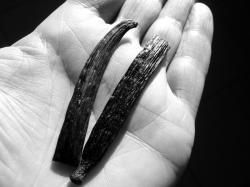Just a Harmless Vanilla Bean?

Some of the greatest, most used, and most profitable breakthroughs in science have not been made by scientists. They have been made by just regular people with too much time on their hands. And the rest of us have to pay-we have to stand in line at pharmacy counters to get over the counter antihistamines. Who would have thought that grinding up cold medication, along with Bunsen burners and a few other household chemicals would produce a high so powerful that one hit can mess you up for life?
Certainly not our kids. Just as with other risky behavior, our children don’t think it could happen to them. Sure, they hear the horror stories, but they’re too smart, too in control, too whatever to do whatever stupid thing the other person did.
Children as young as forth grade have started sniffing glue, lighter fluid, and other aresols. Statistics show that by eighth grade, one in five students have gotten high at least once, and this just from sniffing (called “huffing”) or ingesting common household items (and these are just the statistics from kids being honest).
Some of the more common household items used to get high may surprise you. Some may not. The list includes:
One of the next fads coming over from across the pond is sniffing and even eating mothballs. In France, eating mothballs is the new rage, resulting in hospitalization in some cases. The only active chemical in the moth balls, PDB (paradichlorobenzene), produces a high, and also damage to internal organs. PDB is also found in insect repellants, air fresheners, toilet-bowl and diaper-pail deodorizers, and fungicides.
You just have to ask yourself how bored someone must have been to sit down and ask himself “What would happen if I ate a mothball?”.
Another way to get high off of items found around the house is not as well-known as the “big” drugs, but has been used for decades (my grandfather tells the story of friends using this method to get high).
Products that contain the alcohol Ethanol, such as mouthwash, perfumes, cold medicines, and food flavorings, may cause significant intoxication. Included in this is vanilla extract! Especially the imitation vanilla (a member of the orchid family), can contain massive amounts of ethanol alcohol, producing a very dangerous intoxication, and massive, sometimes irreparable damage to the liver and kidneys.
Other cooking supplies that can be used to get high are nutmeg and cooking spray.
Some of the signs that your teen (or pre-teen) may be abusing some of the less-well known (but much cheaper and easier to get) drugs are:
Probably one of the most used (or misused) ways of “getting back” at parents, or just escaping the mundane that is the life of a teenager is to get high. I have never been completely convinced that peer pressure is the sole cause of our children’s rampant addictions. There has to be an underlying cause for this self-medication.
Before treating a child for any drug addiction, parents have to find and deal with the underlying cause-the reason the child wants to get high, wants to escape from life for a while. Only then can recovery be complete.
- The Most Used Form of CommunicationWriting has, quite surprisingly, become more and more important in today’s electronic society. Everywhere you look on-line there are words. Many used to think that the written word was becoming...
- Keep Your Licensed Teen Safe This SummerEvery year hundreds of teenage drivers lose their lives in motor vehicle accidents. Statistics show that the leading cause of death for young people between the ages of 15 and 20 is motor vehicle...
- Keeping Our Kids Safe in the Post 9/11 WorldRecently, radio talk show host and CNN personality did a week-long special entitled “The Perfect Day.” According to Beck and others, “The Perfect Day” is a coordinated, planned terrorist attack...
- Idle HandsThe worst affliction affecting our kids today is not teen pregnancy, drugs and alcohol, or Internet predators. No. In fact, all those dangers can be traced to-in most cases-a common root....
- Feeling Good in Your Own SkinBody image is a very touchy issue with today’s kids. Since the 1950s, when Barbie was first released, the picture of the “ideal woman” has been almost impossible to attain. With her proportions, if...

